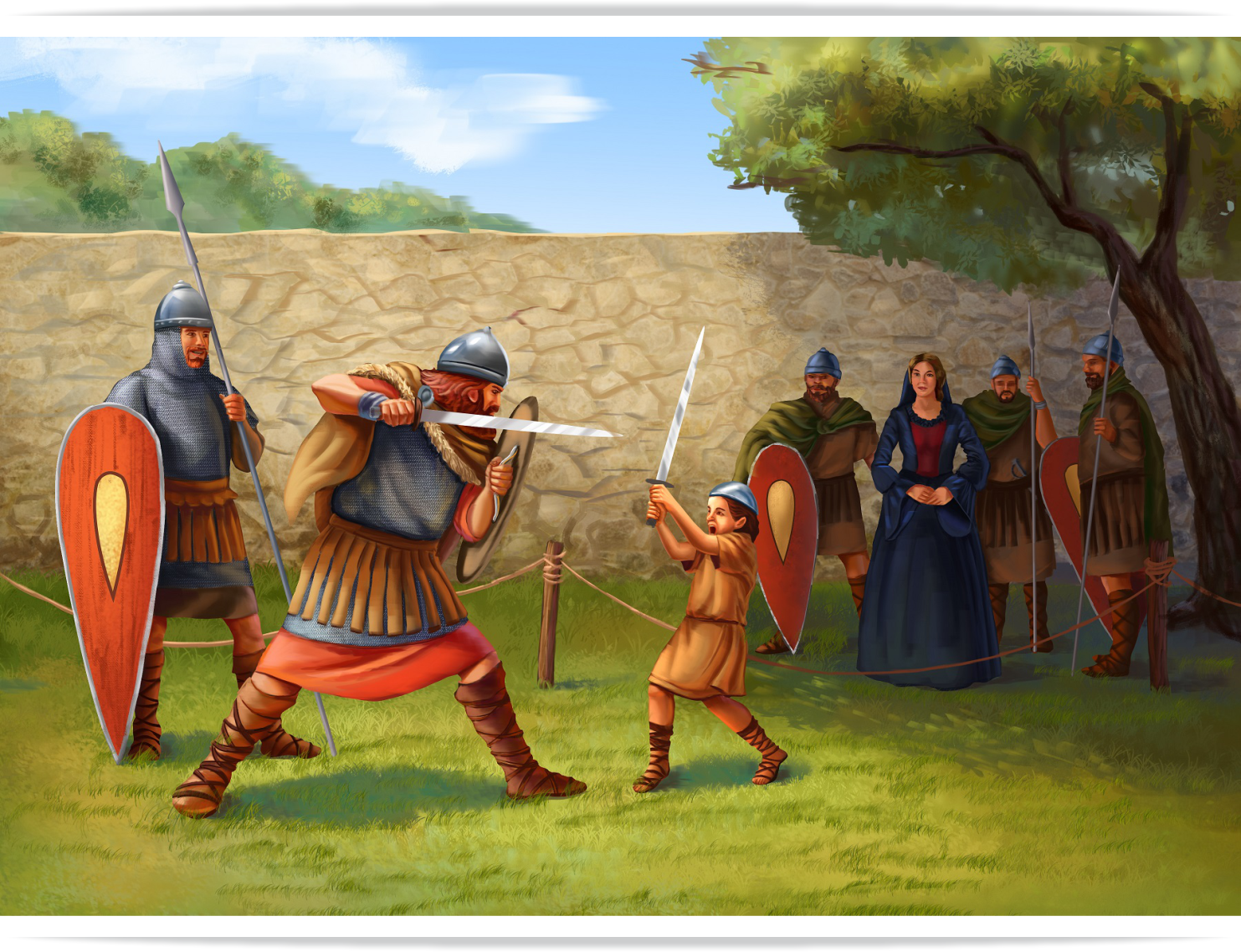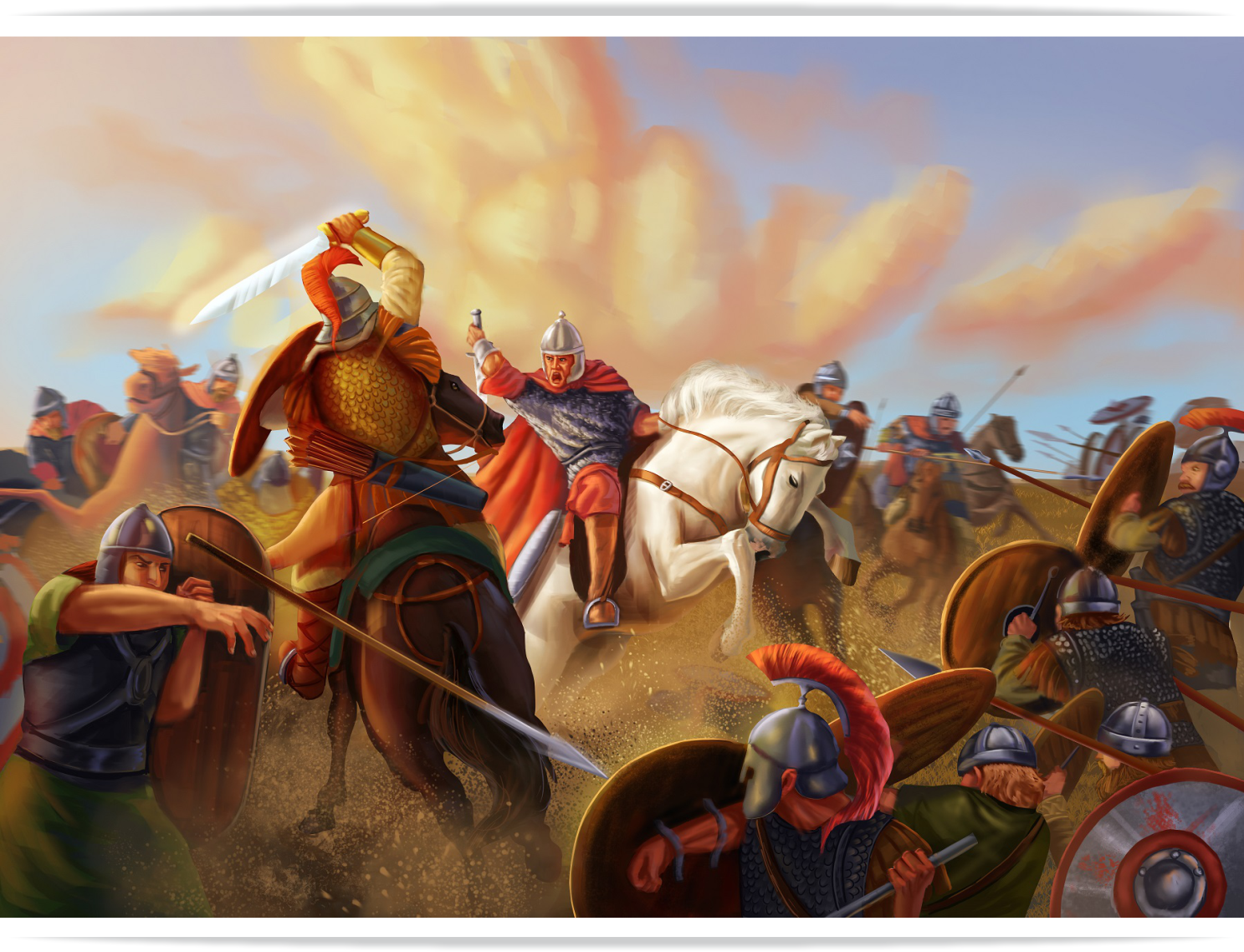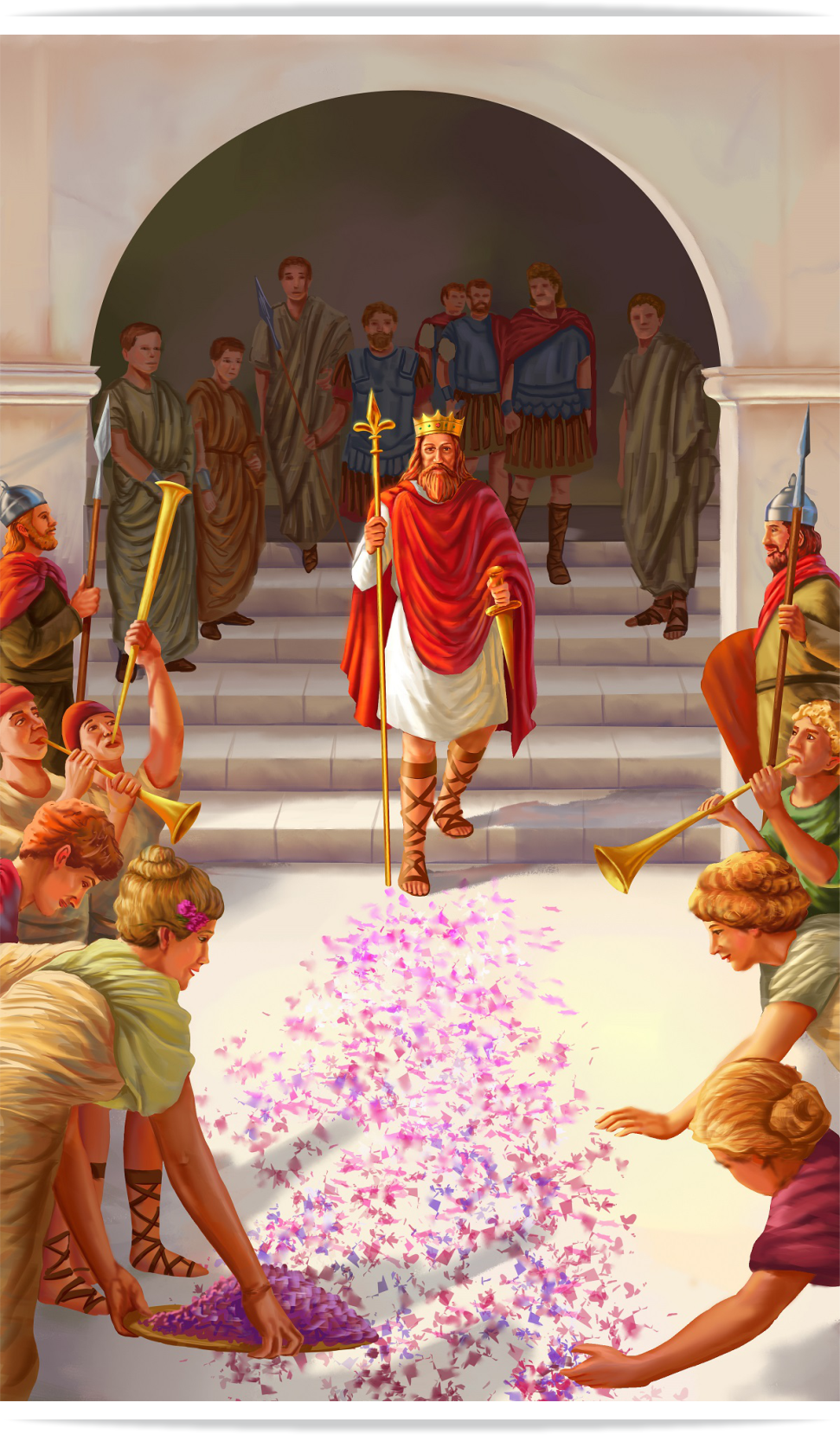
Times of turmoil and war have been happening on the surface of the earth with clockwork precision. Men of the same region, religion and race have fought with each other due to menial differences and destroyed their own. In spite of this, a few kings and queens in history have united such people and carved out kingdoms that have lasted for decades or even centuries and have put themselves on a pedestal of being more than just monarchs.
466 AD was a time when the Great Western Roman Empire was headed towards its downfall, a number of other civilisations had entered into conflict with the mighty Romans and even against each other. The Barbaric Gauls, Celts and Goths had all waged a war against the long-standing kingdom of the Romans. The Goths had the upper hand in most battles with the Romans and the Romans had given up on most of their provinces after being pestered and harassed by the unorganized, battered formations of these new civilisations.
During this era, multiple ethnicities and cultures cropped up such as Franks, the ‘long-haired’ tribe, which had become evident during the beginning of the fourth century. However, the Franks had never been under one ruler or one command due to the cultural differences between Ripuarians and Salians, the 2 important Frankish communities. Rifts were deliberately being created between them by other kingdoms so that they could never unite; because if they did so, they would become very powerful. But the birth of a child born in the Merovingian dynasty of the Salian Franks was destined to change it all; that too in a heroic and warrior-like fashion. He was Clovis I, the first king of Franks. Here’s an embrasure into his life.

Childeric I, the Merovingian king of the Salian Franks, had been on a continuous campaign as the barbarian ally of the Romans representing the Salian Franks, a Germanic tribe. He rode with Roman legions wherever they so pleased and captured and conquered territories for the Roman masters. Childeric was a king in his own right but he had to bow down to the Roman governors and emperors as they had not once but many a time protected the Franks from the Gauls.
Childeric served the Romans and had little time to spare for his own people throughout his reign. His queen, Basina of Thuringia, had always been distasteful of his servitude to the Roman Empire but had little success in convincing him to do otherwise. Childeric and Basina had a little daughter named Audofleda, who was slated to be the queen of the Franks in Tournai.
However, Childeric and Basina longed for a son as they knew that Audofleda would have to be married into another kingdom. This could lead to the fall of the Merovingian dynasty and spell an end to the Salians. Their rivals, the Ripuarians would then have it easy to take over the Belgica Secunda, the area between the Meuse and Somme rivers, the birthplace of the Salian Frankish kingdom.
In the winter of 465 AD, Childeric had been with Aegidius, the military commander of the Roman legion. He had been helping Aegidius to fend off the Visigoths, a section of Goths belonging to the area near the river Rhine as they had been troubling the Roman military. Visigoths were also the contenders of the Roman land along with the Gauls and Ostrogoths.
While in his pavilion, Childeric heard a loud procession coming from the direction of Tournai, the capital of his kingdom. The procession consisted of war drums, pagan priests and Queen Basina’s messenger. As the messenger got within hearing range of Childeric, the drums stopped beating and the priests conducted a ritual, following which the messenger made an announcement to everyone. “Great news has befallen the Merovingians. A gift from the gods has been presented to her highness Basina, a baby boy as white as the winter snow, strong as Thor himself, an heir for the Merovingians has been born.” Hearing this news, Childeric’s war-weary face lit up and he presented the messenger with bounty from the war. After seeking permission from Aegidius to leave for Tournai, he rode towards home as fast as he could.
Upon reaching the queen’s chamber in the palace, Childeric kissed Basina and lifted his son from the cradle and gave a peck on his head. Looking at the innocent face of his son, Childeric could only think of him as the king who would bring in Frankish dominance. He knew that this could be achieved only by being a great warrior and named him Chlodovech or Clovis, meaning a praised fighter.

As Clovis grew in Tournai, he was aided by a number of warriors and teachers in learning the craft of war and the Frankish culture. The early childhood of Clovis was spent playing and roaming around Tournai along with Audofleda. The people of Tournai cherished their young prince and had already hailed him as the future king.
After a few years, in 469 AD, when Clovis was around 4 years old, Childeric had left home to assist the Romans again against the Visigoths. During this time, Basina took the responsibility of grooming Clovis into a Frankish warrior. In her supervision, Clovis learnt and mastered the art of using the sword and the spear, which were the primary weapons of the Franks.

He showed a natural affinity towards duelling and took to horse riding like a duck takes to water. Clovis was efficiently groomed as one among the Franks, who were known for their fierce warrior ways. Basina would watch little Clovis fight against their best trainers and would often dream of the future glory that he could attain.
Meanwhile, Childeric fought hard alongside the Romans to keep the Visigoths at bay. Clovis who followed pagan religion just like all other Franks, would pray every day to the gods for his father’s safe return from the warfront. The Franks believed in the old Germanic gods, such as Thor, the lightning god and Odin, the god of wisdom.
As the years passed by, Clovis grew battle ready. His mother had sowed the seeds of a Frankish rule over the collapsing Roman Empire and the Ripuarians in his mind, making Clovis yearn for the unity of the Franks and rule over the powers of Europe.

Soon after aiding the Romans, Childeric returned to Tournai to be with his family. Seeing his son, Clovis and daughter, Audofleda grown up and matured into a prince and princess, gave him great contentment. He spent some time in his kingdom but towards the end of 480 AD, he was summoned again by the Empire to fend off the Anglo-Saxon pirates, who were troubling the Romans around Southwest Orléans. Childeric successfully chased the pirates away but he took ill during the entire year due to the fatigue of war and old age. When Clovis came to know of it, he expressed a wish to meet his father in Orleans but his repeated pleas fell on deaf ears. His mother, Queen Basina never allowed Clovis to see him as there was a threat of his assassination, which would in turn leave the Salians without an heir. Clovis was upset about not being allowed to meet his father but the saving grace was that his mother, Basina was there by his father’s bedside. Basina cared for Childeric in the best possible way during his last days. However, Childeric succumbed to the illness and passed away in 481 AD. Clovis was devastated with the news of his father’s death and so was the entire family of Merovingians.
Clovis believed that it was the Roman allegiance, which had taken his father’s life and this strengthened his desire to conquer the Roman Empire. On a bright morning of May, in 481 AD, Clovis was crowned the king of the Merovingian Franks with grand pagan traditions and customs. He was 15 years old. This news spread far and wide. The Romans saw it as another soft alliance scheme, and the Gauls, Ripuarian Franks and Goths took it as a weakening of the Salians. Europe had once again been dropped into a political turmoil. All these powers now wanted to take over Tournai.
Back in Tournai, people rejoiced the crowning of their new king, the praised fighter Clovis, who had set his sights on conquering all of the Salians and Ripuarians and bringing them under one rule. Although Basina was in favour of this, she was wary of her son going into battle at such a young age. But Clovis’ resolve was too strong to break and he chose to go to war; his first move being against the warring Salian and Ripuarian Franks around Tournai.

Clovis charged through the entire Belgica Secunda, the area inhabited by the Frankish tribes, and brought them under the rule of the Merovingians. Cambrai, which was a Salian Frank kingdom ruled by Ragnachar, was also taken over by Clovis. However, Clovis let Ragnachar keep his kingship and made him his vassal. Clovis’ aggressive initiation against the Ripuarians kept all the powers of Europe from attacking Tournai and let Clovis keep up his offensive strategy.
In a span of just 3 years, Clovis had brought the entire Salian Frank community under one rule, his rule; with fierce battle tactics and strategy. One of his strategies was a shocking move, made against the will of his mother, which was to get Syagrius, the son of Aegidius, who had been made ruler of the Roman Empire after Aegidius’ death, to help him convince to all the Franks that he was their only true ruler. But Clovis’ intention was to only use this association for his benefit, which was to get the Franks united.
Having the Franks united and Ragnachar as his ally, Clovis aimed at the larger prize of taking down the Romans in battle and establishing Frankish rule outside Italy. He brought together all the Frankish kingdoms except that of King Chararic, who decided against going to war with the Franks.
Clovis’s next move was to march to war against King Syagrius, which caught him off guard. This resulted in the battle of Soissons, which was fought in 486 AD. Clovis showcased his calculated and strategic side in this war to take down the mighty Western Roman Empire. He was a single-minded warrior, who aimed at the ultimate goal rather than being content with smaller options. The Franks battled fiercely under him and the Roman Empire fell to the Franks.

Having won the battle, Clovis was now the undisputed champion of most of Gaul and the rump state of the Roman Empire, except for the land owned by the Ripuarian Franks. He returned to Tournai to plan another campaign to take the Ripuarians down, when he was betrayed by Ragnachar. Ragnachar disagreed with Clovis ruling over the kingdoms of the Franks single-handedly and tried to rebel, along with Chararic, who had refused to go to war against the Romans.
Left without a choice, Clovis, decided to kill Ragnachar, as he would pose a great danger to the unity of the Franks and had him assassinated in 490 AD. He also captured Chararic and had him tonsured and ordained as a priest. Clovis’ strong-handed response to the rebellious Franks, sent a strong message throughout his allies and they marched along on to his next campaign; establishing his supremacy in Europe.

In the beginning of 491 AD, Clovis’ mother, Queen Basina advised Clovis to take the support of the Thuringians; people from her home country, as they would prove instrumental in controlling his kingdom. However, despite Clovis’ plea for alliance, the Thuringians maintained a hostile stance towards the Salians. Clovis once again decided to take the matters into his hand, albeit the hard way and defeated the Thuringians in 491 AD. By this time, all the Frankish kingdoms were under Clovis’ rule.
Day by day, Clovis’ power was growing. This made Ostrogoths insecure as they felt threatened. They assumed that a clash with the Franks was inevitable. On the other hand, Clovis knew that he could not win against the Goths so in a smart political move, he extended a hand of friendship by convincing his sister Audofleda to marry the Ostrogothic king, Theodoric the great in 492 AD. With this move, Clovis secured an alliance through familial relations with the Ostrogoths. Clovis implemented a similar strategic move to be friends with the Burgindians and married Clotilde, a Catholic in the court of Arian Christians, in 493 AD. Clovis was already married to a pagan wife and had a son named Theuderic from her. After marriage, Clotilde would often urge her husband to convert into Christianity but Clovis was adamant about following his pagan gods. When a son was born to Clotilde, she got him baptised without Clovis’s will and he died at a young age. After their second son was born, Clotilde got him baptised again secretly from Clovis and he fell seriously ill. Fortunately, the son survived but this made Clovis despise Christian faith. Eventually, he had 3 more sons and a daughter.

Now Clovis shifted his attention towards the Ripuarians. But, instead of a battle cry, Clovis got a call for help from the Ripuarian King Sigebert the Lame. The Ripuarian capital of Cologne had been raided and looted by the Germanic people known as the Alemanni, an indigenous tribe, who had held on to their lands even against the Romans. Clovis found this as an excellent opportunity to win over the Ripuarians. Also, by taking over the Alemanni, Clovis had complete control over Paris. In 496 AD, the Battle of Tolbiac was fought against the Alemanni, wherein the Ripuarians and Salians fought together. This battle however, changed Clovis forever; the Alemanni proved to be a tough enemy. The Alemanni relied more upon guerrilla warfare and this harassed the heavy cavalry of Clovis and kept the Franks on the losing side.
Clovis prayed to his gods for aid, but nothing seemed to change the scenario of the battle. In this time of crisis, Clovis remembered his wife Clotilde’s words. Clotilde had said that in time of need if he prayed to her god, Clovis would benefit and that the consequence of their sons was ill-fate and definitely not the Christian faith.
Clovis decided to go by his wife’s belief and so he called upon help from the Christian god and promised to himself that he would turn Christian if he was helped to win in this battle. The next morning, as the war horn sounded and the battle began, the Alemanni began to race away from the Frankish Cavalry. Clovis had led the charge and seeing the enemy flee infused his faith in Christianity.
Following his victory, Clovis decided to convert to Christianity keeping his promise. He also thought of the advantages that would come his way with this move. A major plus point being that the Roman hierarchy and his Roman subjects would open-mindedly accept him as the ruler of the Western Roman Empire. In 498 AD, Clovis converted to Christianity by Saint Remigius, a Roman priest and a subject of Clovis. He was baptised on 25th of December at a small church in the vicinity of the subsequent Abbey of Saint-Remi, near the site of Cathedral of Reims. At the same event, around 3000 of his soldiers were also baptised.
Soon after Clovis’s conversion, much of the Frankish generals began despising Clovis, however they never vented out their emotion in the battlefield. In fact, they remained loyal to him in battle, for he was the one who had brought them under one rule and given them a true Frankish kingdom. After this acquisition, Clovis set out to organise his kingdom and for that he released the first Frank law as a king which listed various crimes and the punishment that was to be meted out to the guilty. These actions made Clovis one of the first kings in Frankish history to rule by law and the codes of Christianity.

In the beginning of 500 AD, Clovis launched an attack on Dijon, a Burgundian province. The Burgundians offered strong resistance, which made Clovis change his decision of attack into retreat and he then turned his attention to the nearby Visigothic kingdom of Toulouse. Clovis used heavy siege and infantry against the light armoured foot soldiers of the Visigoths and took over the kingdom of Toulouse by taking down the Visigothic army in the Battle of Vouille in 507 AD. He slew King Alaric II. Therein, he gained the support of the tribe of Arverians who had been liberated from the Visigothic rule. This helped Clovis restrain the Visigoths out of Aquitaine, the 27 regions in the south-west of modern day France and he established the capital of this kingdom at Paris. He also established an abbey dedicated to the Saints Peter and Paul on the south bank of the river Seine. After this victory, Clovis was granted the title of Consul by the Byzantine Empire, making him a close ally of the Byzantines, a strong western European power. By 507 AD, the entire France except a narrow strip along the Mediterranean was under his rule. In 508 AD, Clovis finally became the king of all Franks by defeating Ripuarian Franks in the Battle of Cologne and consolidated his power as the one true king of the Franks.


Once Aquitaine was conquered, Clovis’ next political step was to subdue the remaining Frankish kings in order to eliminate any chances of rebellion amongst the Franks. Some of these kings were Ricchar, brother of Ragnachar of Cambrai and their brother Rignomer of Le Mans. Once this was achieved, Clovis heaved a sigh of relief and then peacefully shifted his attention to cultural and theological matters.
Clovis called upon a Synod or the holy council of the Church along with Gallic Bishops for a meeting in Orléans. It was to bring reforms in the Church and create a strong bond between the Crown and the Clergy. This historical event is known as the First Council of Orléans, wherein 33 bishops assisted Clovis and 31 decrees regarding the duties and obligations of individuals were created. Clovis brought in equality between Roman and Frank subjects by implying the decrees on the former and the latter. However, while returning from Orléans, Clovis was afflicted with fever and fatigue. So, he chose to concentrate on his sons and the Catholic faith.
As the weeks passed by, Clovis’ health began to deteriorate rapidly. The pagan witch doctors and Catholic medicine men tried in vain to get him out of his discomfort. Clovis sensed that his end was nigh and dedicated more and more of his time to peaceful purposes. Clotilde and his sons were also aware of this and hence started taking care of the matters of the kingdom. Observing their servitude towards the kingdom, Clovis divided his kingdom equally amongst his four sons, Theuderic, Chlodomer, Childebert and Clotaire. Clovis finally breathed his last after a severe bout of fever on the morning of 27th of November, 511 AD. He was 45 years of age. He was laid to rest in the Saint Denis Basilica, near Paris in a Catholic as well as a Pagan ceremony.
Clovis’s death was grieved by the entire Frankish kingdom. And why not? He had successfully vanquished the Romans and brought Europe under the Frankish rule. After his death, the regions of Rheims, Orléans, Paris and Soissons were divided among Clovis’s sons and became the new political units of the Frankish kingdom.

Clovis is remembered even today for his unparalleled contribution to the unification of the Frankish nation. He strongly and single-handedly brought together the warring tribes of the Franks and etched out a nation. This also established the Frankish influence upon people beyond the borders of Gaul, a task, which no other regional king could match. His conversion to Christianity led him to become an ally of the papacy and protector of the Catholic people.
Clovis was remembered in France in perhaps the most royal way after his death, as 18 kings of France took on the name Louis, a later French form of the name Clovis. Clovis’ conversion into Catholicism was that of one man and not of his kingdom, but it holds great importance in Frankish history. The Merovingian dynasty formed by Clovis ruled France for another 200 years until its collapse and sowed the seeds of the French culture as we know today. The achievements of Clovis are till date shining brighter than those of any other regional king as it was only him who rose above petty civil conflicts and internal battles and took over the larger enemy; the Western Roman Empire and began an era of the Franks which overshadows that of the other warring clans of Europe.
Next Biography











